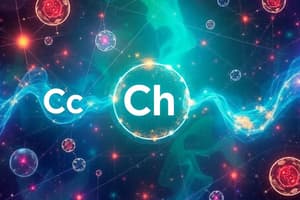Podcast
Questions and Answers
What is chemistry?
What is chemistry?
Chemistry is the science that deals with the structure of matter.
Mass and weight are always equivalent.
Mass and weight are always equivalent.
False (B)
Mass is a physical property that determines the weight of an object in _____ gravitational field.
Mass is a physical property that determines the weight of an object in _____ gravitational field.
Earth's
What are atoms?
What are atoms?
Which of the following subatomic particles are found in the nucleus of an atom?
Which of the following subatomic particles are found in the nucleus of an atom?
What charges do protons and electrons carry?
What charges do protons and electrons carry?
In determining the mass of an atom, which particles are primarily considered?
In determining the mass of an atom, which particles are primarily considered?
Flashcards are hidden until you start studying
Study Notes
Chemistry
- Chemistry studies the structure and properties of matter, defined as anything occupying space and having mass.
- The field encompasses the examination of matter and the energy changes involved in related processes.
Mass
- Mass is a physical property influencing an object's weight in Earth's gravity, differentiating it from weight, which can change in different gravitational contexts.
- An example is experiencing weightlessness in orbit while maintaining unchanged mass.
Atoms
- Atoms represent the smallest stable units of matter, crucial for determining the characteristics of substances, whether living or nonliving.
- The properties of an object stem from the specific types of atoms and their interactions.
Subatomic Particles
- Atoms consist of subatomic particles: protons, neutrons, and electrons.
- Protons and neutrons are found in the nucleus, contributing to the atomic mass and exhibiting similar size and mass.
- Protons carry a positive charge, whereas neutrons are neutral.
Electrons
- Electrons are significantly lighter than protons and possess a negative charge, orbiting outside the nucleus.
- When calculating an atom's mass, the contribution of electrons is negligible; therefore, mass is primarily determined by the number of protons and neutrons present in the nucleus.
Studying That Suits You
Use AI to generate personalized quizzes and flashcards to suit your learning preferences.




